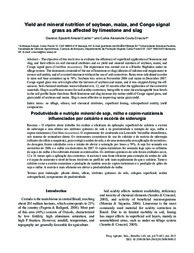Yield and mineral nutrition of soybean, maize, and Congo signal grass as affected by limestone and slag.
Yield and mineral nutrition of soybean, maize, and Congo signal grass as affected by limestone and slag.
Author(s): CASTRO, G. S. A.; CRUSCIOL, C. A. C.
Summary: The objective of this work was to evaluate the efficiency of superficial application of limestone and slag, and their effects on soil chemical attributes and on yield and mineral nutrition of soybean, maize, and Congo signal grass (Urochloa ruziziensis). The experiment was carried out in a Rhodic Hapludox under no tillage system. The treatments consisted of the use of limestone or slag (silicates of calcium and magnesium) to correct soil acidity, and of a control treatment without the use of soil correctives. Rates were calculated in order to raise soil base saturation up to 70%. Soybean was sown in November 2006 and maize in December 2007. Congo signal grass was sown right after the harvests of soybean and maize, and it was cropped during the offseasons. Soil chemical attributes were evaluated at 6, 12, and 18 months after the application of the corrective materials. Slag is an efficient source for soil acidity correction, being able to raise the exchangeable base levels in the soil profile faster than lime. Both limestone and slag increase dry matter yield of Congo signal grass, and grain yield of soybean and maize. Slag is more effective in improving maize grain yield.
Publication year: 2013
Types of publication: Journal article
Unit: Embrapa Amapá
Observation
Some of Embrapa's publications are published as ePub files. To read them, use or download one of the following free software options to your computer or mobile device. Android: Google Play Books; IOS: iBooks; Windows and Linux: Calibre.
Access other publications
Access the Agricultural Research Database (BDPA) to consult Embrapa's full library collection and records.
Visit Embrapa Bookstore to purchase books and other publications sold by Embrapa.

